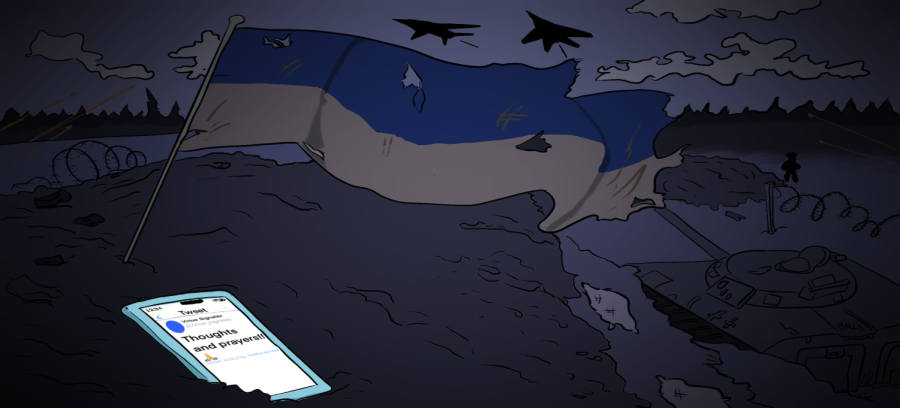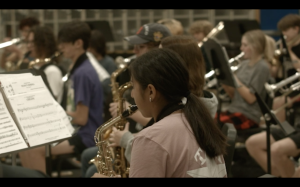6,042 miles.
Now is not the time to turn a blind eye to Ukraine
Before simply changing your profile picture to the Ukrainian flag ask yourself- why am I doing this?
May 4, 2022
As war rages and images of crying children and dead civilians flash across television screens, newspapers and social media feeds, Ukraine has become associated with tragedy. Faced with inhumanity, people far removed for the direct conflict have begun the process of humanizing a country halfway across the world.
That is, until they turn off the TV.
Though this is no doubt a natural reaction, we must recognize that there’s a privilege that comes with turning away the second we begin to feel inklings of discomfort. The “out of sight, out of mind” mentality becomes even more tempting in our new digital age. As we sit comfortably on our couches, scrolling on our iPhones, the ability to detach from tragedy is nothing but a click away. The temptation to detach completely from the Ukrainian war is further compounded by the hopelessness that seeps into us when we do choose to pay attention. As we watch a conflict halfway across the globe, a conflict that even the world’s leading politicians don’t know how to deal with, the inevitable question arises: what can I possibly do?
As students with admittedly limited knowledge about complex foreign affairs, we’re not prepared to offer up geopolitical solution to this devastating conflict; however, as we continue to navigate this tragedy ourselves, we suggest to our fellow students two things: 1) to be genuine and 2) to not look away.
Shortly after the invasion of Ukraine, social media erupted with infographics trying to explain the conflict, people promoting charities and food drives and others offering their general support to the people of Ukraine. The national/global tragedy to social media pipeline has become a key tenet of Gen Z culture and that isn’t necessarily a bad thing; offering support and solidarity isn’t something to be scorned. We do believe that discussing the war in Ukraine — whether it be in real life or online — is better than completely turning a blind eye. From time to time, however, it’s healthy for individuals to inspect where their intentions may lie. Next time, before re-posting an Instagram infographic or changing profile pictures to the Ukrainian flag, perhaps ask yourself — why am I doing this? Am I doing this to try and help Ukraine? Or am I doing this so that my followers can see that I’m trying to help?
As we stated earlier, we are not suggesting that solidarity isn’t worthwhile; however, true solidarity extends beyond just re-posts, shares and declaring how much of a tragedy the situation is.
Above all, we must recognize that as students, the feelings of hopelessness, despair and confusion we may be feeling regarding how to react to this tragedy pale in comparison to the feelings of those fighting for their survival in Ukraine. We urge the members of the McCallum community not to shift this narrative of tragedy to a narrative of their own virtue and ultimately, continue paying attention to Ukraine. Donate, volunteer, listen to Ukrainian voices, but out of respect for our fellow human beings, do not turn a blind eye.









Sylvie Powell • May 7, 2022 at 12:15 am
I totally agree. I agree that sometimes when things get too scary for us, we just look away…and I’ve never really recognized the privilege that I have to do so. So much of our lives are on social media, so using it to bring awareness to the issue is good. However, sometimes the intentions are not the same, and we don’t realize and wonder why we’re actually posting the things we post.
Noah Braun • May 5, 2022 at 9:50 pm
Back when I was doing research for an article I had to write about the then-recent Ukraine war back sometime in March, the war was all anyone could seem to think about for the first few weeks. I agree that it is sad, but understandable, that the conflict has lost the attention it deserves. It is even more of a tragedy that it will probably take some big catastrophe in the war in order for it to regain its spotlight, although we should try to always think positive.